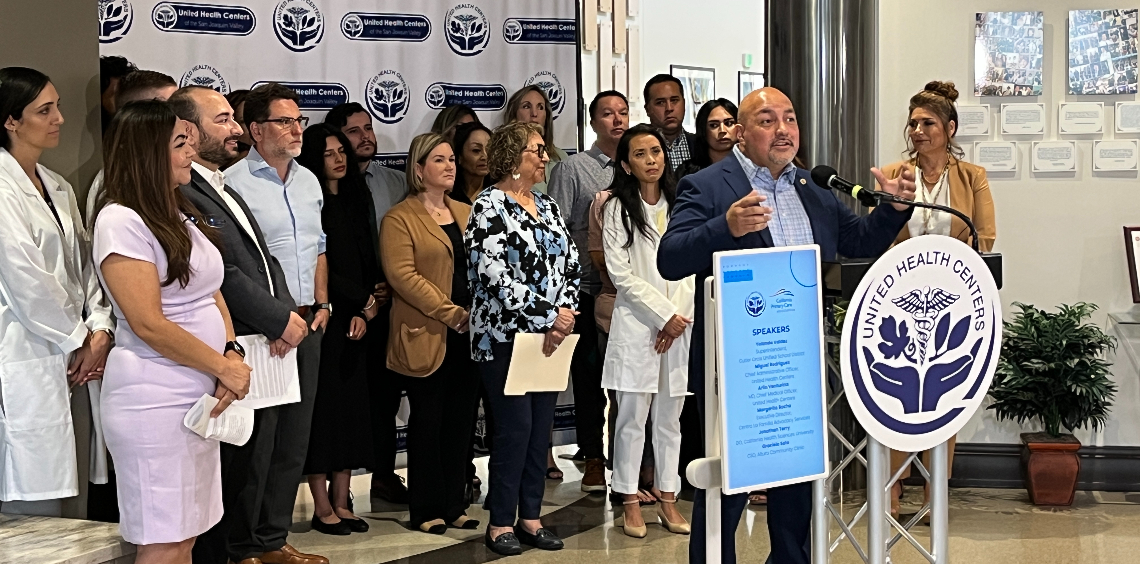Proposal to cap admin pay, mandate patient spending levels draws fire from local health leaders

Miguel Rodriguez, chief administrative officer of United Health Centers of the San Joaquin Valley, speaks at a news conference on Tuesday, Aug. 11, 2025. Photo by Frank Lopez
Written by Frank Lopez
Central Valley health leaders are calling out a union’s proposed ballot measures capping executive pay and dictating the level of resources that go directly to patients.
United Health Centers of the San Joaquin Valley (UHC) and the California Primary Care Association (CPCA), along with other local health and community leaders, held a news conference Tuesday morning at the UHC administrative building in north Fresno to oppose a statewide initiative from the Service Employees International Union-United Healthcare Workers (SEIU-UHW).
The initiative, proposed for the November 2026 ballot, would require community clinics that are Federally Qualified Health Centers (FQHCs) to devote at least 90% of their total revenue to direct patient care and mission-related services.
The measure would also mandate that clinics publicly report their financials and spending priorities.
According to a news release from SEIU-UHW, the measure is necessary because “too many community clinics are directing funds to executive perks and administrative overhead instead of investing in better staffing, equipment, and services for patients.”
UHC and CPCA called it a “reckless ballot measure” that would lead to more harm to the poor, the uninsured, the LGBTQ+ community, immigrants and working families.
Miguel Rodriguez, chief administrative officer of UHC, said their clinics are a trusted health care provider — and sometimes the only provider.
The SEIU-UHW also filed paperwork for a ballot measure that would cap compensation packages for hospital and medical group leaders at $450,000.
According to the California Hospital Association, the measures would make it “difficult — if not impossible” to recruit and retain quality administrators.
Rodriguez said he challenges anyone to visit one of the local UHC facilities to see the investment in buildings, staffing and equipment.
“This is a ballot measure that could force some of the FQHCs to close or shut down clinics due to extra administrative costs. Shame on UHW for political gain to sacrifice and put the communities that are most vulnerable at risk with this initiative,” Rodriguez said.
UHC Chief Medical Officer Arlin Venturina said the initiatives will undermine California’s health care safety net.
“It will be detrimental and affect millions of our patients,” Venturina said. “It’s disheartening. It will jeopardize our critical and crucial services that we provide. If this ballot is passed it will divert $1.7 billion away from patient care each year.”
Venturina said the measures would eliminate essential services including community navigators, transportation services and housing assistance programs.
Tulare County’s Altura Community Clinic CEO Graciela Soto said that as a FQHC, they are governed by their patients and board of directors.
Soto said the proposed initiatives are hurtful to community hospitals and would impact their ability to offer services to patients enrolled in Medi-Cal, Covered California and other social programs.
“Patients and clinics like ours are under relentless and unprecedented attacks — from federal cuts to Medicaid and state budget cuts that threaten stability of vital health services. I don’t understand why SEIU-UHW is wanting to pose harm to clinics and push us to close our doors or programs that help our underserved and uninsured,” Soto said.
According to SEIU-UHW membership, the measure is necessary because frontline workers deserve better.
“Clinics receive public dollars to serve vulnerable populations, but when that money is siphoned off for bloated administrative costs, it’s the patients and workers who suffer,” said Brisa Barrera, a health care worker at a community clinic in Santa Rosa. “This measure ensures that resources go where they’re needed most: into the clinics and toward care.”
Once the California attorney general issues a title and summary for the measures in the next few months, that gives SEIU-UHW 180 days to collect voter signatures. The secretary of state would then verify these signatures and approve the measure for the ballot by early summer 2026.
According to the secretary of state, the current initiative signature requirement is 546,651 registered voters, representing 5% of the electorate for the most recent gubernatorial race.








